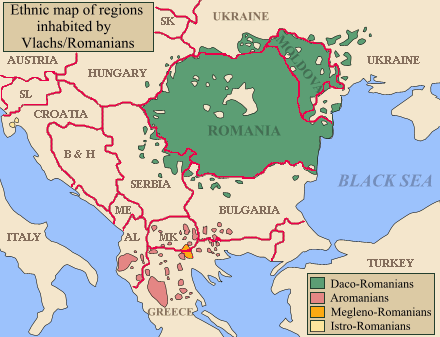| Revision as of 12:00, 9 April 2004 editBogdangiusca (talk | contribs)39,816 editsm moved the image← Previous edit | Revision as of 00:08, 13 April 2004 edit undoHenrygb (talk | contribs)12,381 edits Vlachs/Welsh/WallonsNext edit → | ||
| Line 3: | Line 3: | ||
| They are the descendants of the Roman ] or of the Romanized ]n, ] and ] local population (see ] for more about the dispute about the origin). Their languages are closely related to each other and it is believed that they were still the same language until the ]. | They are the descendants of the Roman ] or of the Romanized ]n, ] and ] local population (see ] for more about the dispute about the origin). Their languages are closely related to each other and it is believed that they were still the same language until the ]. | ||
| The origin of the name is |
The origin of the name is ]: the same origin led to the words ] and ] in other parts of Europe. ] initially used the name Vlachs when referring to ] in general. Later on, the meaning got narrower or just different. For example ] in ] is called Włochy. In ], '']'' is the name given to a part of their original territory. | ||
| <table align="right" width="370"> <tr><td align="center"> ] </td></tr> <tr><td align="center"><small> ''Map of Balkans with regions inhabited by Romanians/Vlachs highlighted'' </small></td></tr></table> | <table align="right" width="370"> <tr><td align="center"> ] </td></tr> <tr><td align="center"><small> ''Map of Balkans with regions inhabited by Romanians/Vlachs highlighted'' </small></td></tr></table> | ||
Revision as of 00:08, 13 April 2004
Vlachs (also called Wlachs, Wallachs, Olahs) are the Romanized population in Central and Eastern Europe, including Romanians, Aromanians, Istro-Romanians and Megleno-Romanians, but since the creation of the Romanian state, this term was mostly used for the Vlachs living South of Danube.
They are the descendants of the Roman colonists or of the Romanized Dacian, Thracian and Illyrian local population (see Origin of Romanians for more about the dispute about the origin). Their languages are closely related to each other and it is believed that they were still the same language until the 10th century.
The origin of the name is Germanic: the same origin led to the words Welsh and Walloons in other parts of Europe. Slavic peoples initially used the name Vlachs when referring to Romanic peoples in general. Later on, the meaning got narrower or just different. For example Italy in Polish is called Włochy. In English, Wallachia is the name given to a part of their original territory.
 |
| Map of Balkans with regions inhabited by Romanians/Vlachs highlighted |
Romanians (also known as Daco-Romanians, speaking Romanian language) are living in
and as a minority in
- Ukraine - 500,000; in Southern Bessarabia and Northern Bukovina
- Serbia and Montenegro - 35,000, mostly in the Serbian Banat
- Bulgaria - 20,000
- Hungary - 11,000
- Slovakia - 9,000
Aromanians (speaking Macedoromanian language) are living as a minority in
- Northern Greece - between 700,000 and 1,200,000; mainly in the Pindus Mountains
- Note: the Greek government does not recognise any ethnic divisions, so there are no exact statistics. See Demographics of Greece.
- Serbia - between 40,000 and 200,000; mostly in the Timok Valley
- Republic of Macedonia - between 150,000 and 180,000
- Albania - between 100,000 and 400,000
- Romania - about 50,000; mostly in Dobruja
- Bulgaria
Megleno-Romanians (speaking Megleno-Romanian language) are living in the Greek province of Meglen, with a population of 12,000.
Istro-Romanians (speaking Istro-Romanian language) are living in Croatia, with a population of less than 1,000.
Religion
The religion of the Vlachs is predominantly Eastern Orthodox Christianity, but there are some regions where they are Catholics and Protestants (in Transylvania) and a few are even Muslims (in some regions of Greece and in the European part of Turkey).
See also:
- List of Romanians - Vlachs of Romanian ethnicity
- List of Vlachs - Vlachs of Aromanian ethnicity
- History of Romania - Vlachs from North of Danube
- History of Vlachs - Vlachs from South of Danube